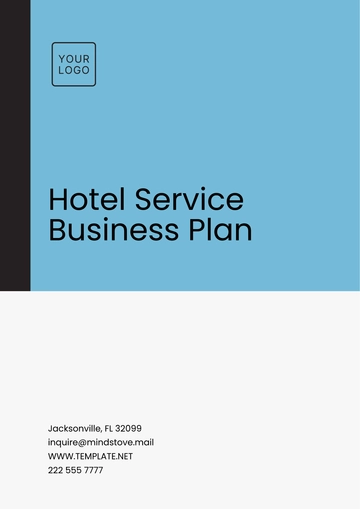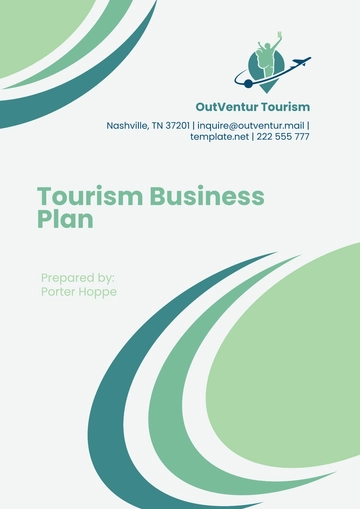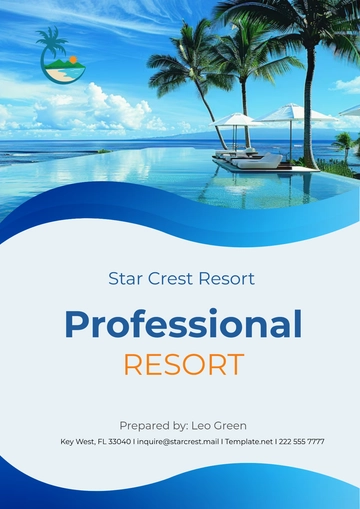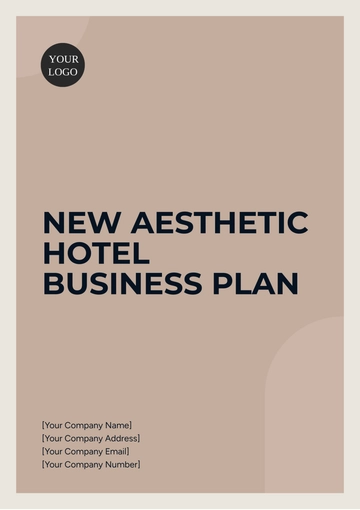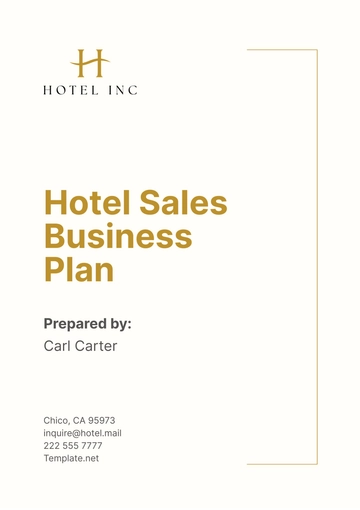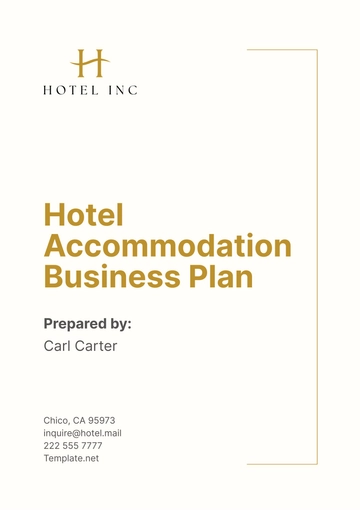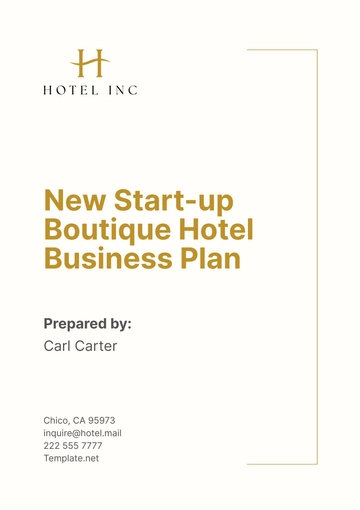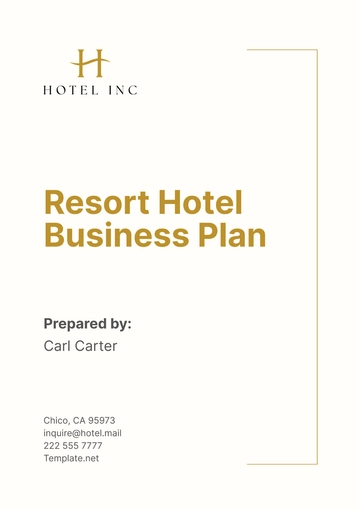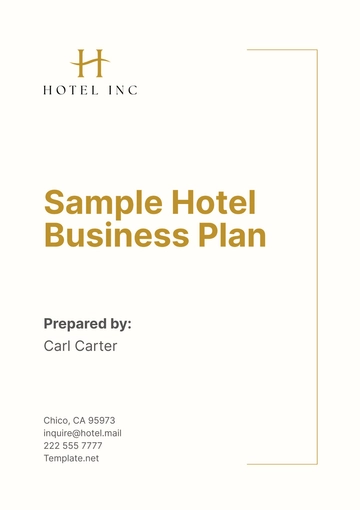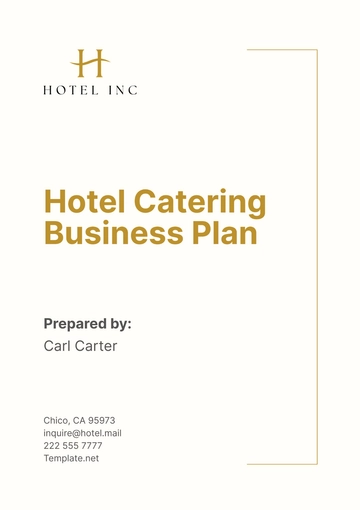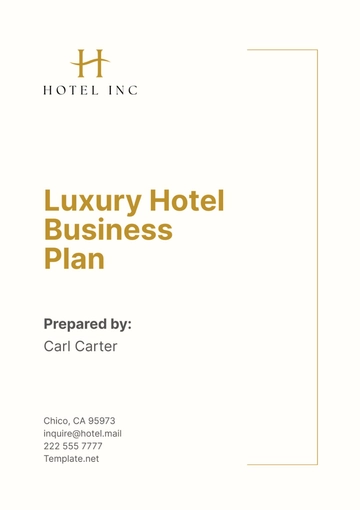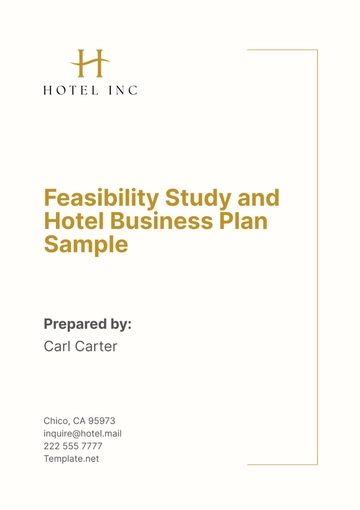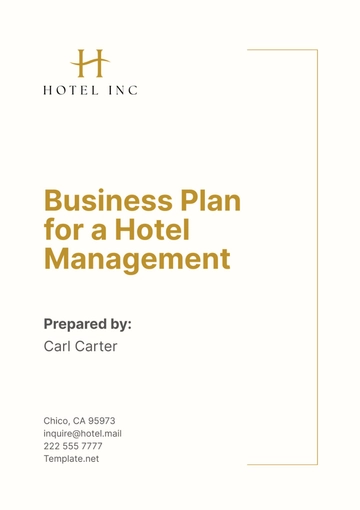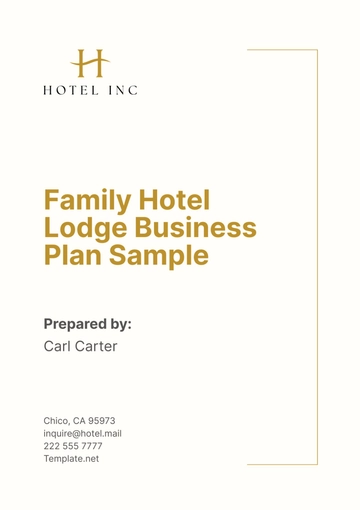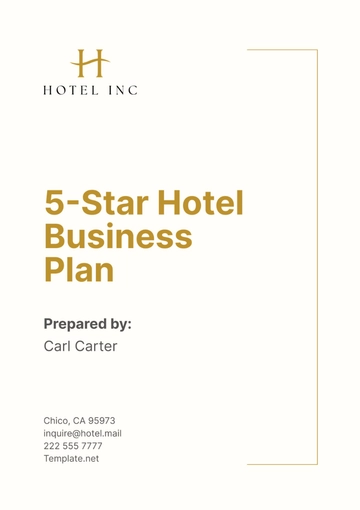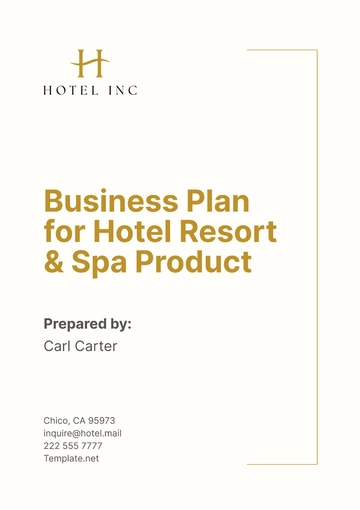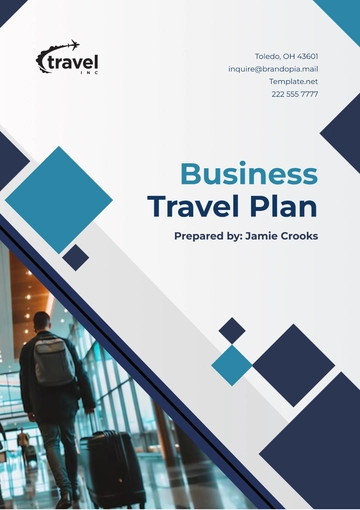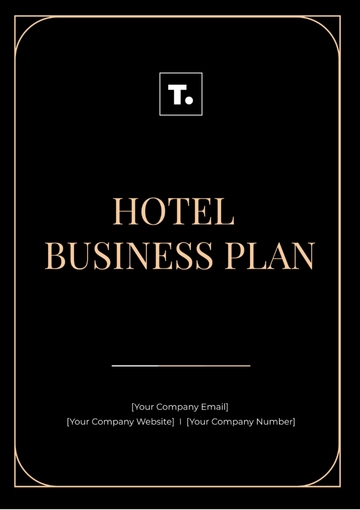Free 5-Star Hotel Business Plan Sample
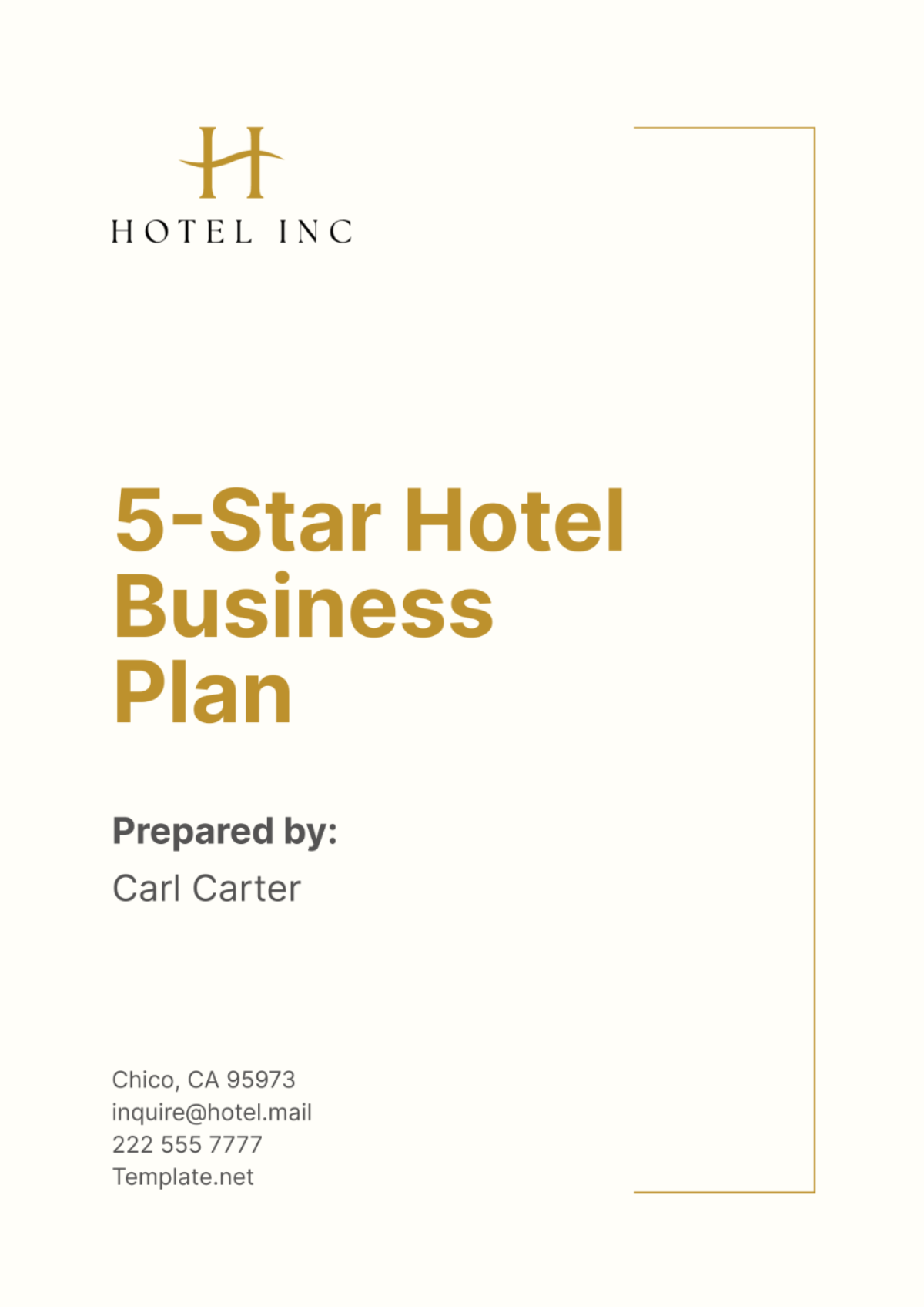
I. Executive Summary
A. Overview
[Your Company Name] is set to redefine luxury hospitality in downtown [City] with a new 5-star hotel that combines modern elegance with exceptional service. Our hotel will offer 150 meticulously designed rooms and suites, state-of-the-art conference facilities, a world-class spa, and gourmet dining options. Strategically located near key attractions, [Your Company Name] aims to become the preferred choice for discerning travelers seeking an unparalleled experience in the heart of the city.
B. Mission and Vision Statements
Mission: To provide an unparalleled level of comfort and luxury, creating memorable experiences for our guests through exceptional service, innovative amenities, and a commitment to excellence.
Vision: To be recognized as the premier 5-star hotel in [City], renowned for our elegance, innovation, and personalized guest experiences, setting new standards in the hospitality industry.
C. Objectives
Achieve an average occupancy rate of 85% within the first year of operations, driven by strategic marketing and superior service.
Obtain a 95% guest satisfaction rate, ensuring repeat business and positive word-of-mouth.
Generate a net profit margin of 20% by the end of the third year, ensuring financial stability and growth potential.
II. Company Description
A. Legal Structure
[Your Company Name] will operate as an LLC (Limited Liability Company), combining the flexibility of a partnership with the limited liability protections of a corporation. This structure is ideal for facilitating investment and managing operational risks while allowing for streamlined decision-making processes.
B. Hotel Concept
[Your Company Name] will feature a unique blend of contemporary design and classic elegance, offering guests a serene retreat in the bustling city. The hotel's interior will feature high-end finishes, custom furnishings, and cutting-edge technology to enhance the guest experience. Key highlights include a rooftop bar with panoramic city views, an extensive art collection showcasing local artists, and bespoke services tailored to individual guest preferences.
C. Location
Located in the vibrant downtown area, [Your Company Name] is within walking distance of Union Square, the Financial District, and the Moscone Convention Center. The hotel's prime location provides easy access to top cultural attractions, shopping districts, and gourmet dining options, making it an ideal base for both leisure and business travelers.
III. Market Analysis
A. Industry Overview
The luxury hotel market in [City] is thriving, with increasing demand from both domestic and international travelers. The city's status as a major business hub and tourist destination drives steady growth in the hospitality sector. Key industry trends include a focus on personalized guest experiences, sustainable practices, and the integration of advanced technology to enhance service delivery.
B. Target Market
Our primary target market consists of affluent leisure travelers, corporate executives, and international tourists aged 30-60. These individuals value high-quality accommodations, exceptional service, and unique experiences. Secondary markets include event planners and organizations seeking premium venues for conferences and special events.
Segment | Description | Estimated Size |
|---|---|---|
Leisure Travelers | Affluent individuals and families on vacation | [00]% |
Corporate Executives | Business travelers and corporate groups | [00]% |
International Tourists | High-income tourists from abroad | [00]% |
C. Competitive Analysis
Key competitors in the area include [Competitor A], [Competitor B], and [Competitor C]. These hotels offer well-established luxury services, but [Your Company Name] will differentiate itself through unparalleled customer service, innovative technology, and unique amenities. Our competitive edge lies in our ability to provide a more personalized and intimate guest experience, complemented by our strategic location and modern facilities.
D. Market Needs
Our target market demands luxurious accommodations, high-quality service, and exclusive amenities. They seek unique experiences that go beyond standard hotel offerings, such as personalized concierge services, curated local experiences, and wellness-focused facilities. By addressing these needs, [Your Company Name] will position itself as the top choice for discerning travelers.
IV. Services and Amenities
A. Room Types
Presidential Suites: These opulent suites feature panoramic city views, private terraces, and dedicated butler service, providing the ultimate in luxury and privacy.
Executive Suites: Ideal for business travelers, these spacious rooms include separate living areas, executive desks, and access to exclusive lounge services.
Deluxe Rooms: Our deluxe rooms offer elegant design, premium furnishings, and all modern amenities, ensuring a comfortable and stylish stay for all guests.
B. Facilities
Gourmet Restaurants: Featuring renowned chefs and diverse cuisine options, our restaurants will cater to a variety of tastes and dietary preferences, offering everything from fine dining to casual fare.
Spa and Wellness Center: Guests can unwind with a range of holistic treatments, fitness facilities, and a serene environment designed to promote relaxation and well-being.
Business Center: Equipped with state-of-the-art meeting rooms, conference facilities, and comprehensive business services, our center will support the needs of corporate travelers and event planners.
C. Guest Services
Concierge Services: Our knowledgeable concierge team will provide personalized recommendations and arrangements for dining, entertainment, and travel, ensuring every guest's stay is tailored to their preferences.
24/7 Room Service: Guests can enjoy a wide selection of gourmet dishes delivered directly to their rooms at any time, day or night.
Valet Parking and Limousine Services: To enhance convenience and luxury, we offer valet parking and limousine services, ensuring seamless and stylish transportation for all guests.
V. Marketing and Sales Strategy
A. Branding
[Your Company Name] will be positioned as the epitome of luxury and sophistication in [City], with a focus on delivering exceptional service and exclusive experiences. Our branding will emphasize elegance, innovation, and personalized guest care, establishing a strong identity in the competitive luxury hotel market.
B. Marketing Plan
Digital Marketing: We will leverage SEO, PPC, and social media campaigns to attract online bookings and engage with potential guests. Our website will feature an intuitive booking system, virtual tours, and detailed information about our services and amenities.
Influencer Partnerships: Collaborating with travel and lifestyle influencers will enhance our brand visibility and credibility, reaching a wider audience of affluent travelers.
Traditional Advertising: Print ads in high-end magazines, local publications, and travel guides will complement our digital efforts, targeting potential guests who prefer traditional media.
C. Sales Strategy
Corporate Partnerships: We will establish agreements with local businesses and international corporations, offering preferred rates and exclusive packages to attract corporate clients.
Travel Agencies: Partnering with high-end travel agencies will help promote [Your Company Name] to their affluent clientele, driving bookings and brand recognition.
Direct Booking Incentives: Offering discounts, special packages, and additional perks for guests who book directly through our website will encourage direct bookings and foster brand loyalty.
D. Loyalty Programs
[Program Name]: Our loyalty program will offer exclusive benefits such as room upgrades, early check-in/late check-out, and invitations to special events. Members will earn points for each stay, which can be redeemed for complimentary services and amenities, enhancing guest retention and satisfaction.
VI. Operations Plan
A. Daily Operations
Daily operations at [Your Company Name] will be managed by a highly skilled team led by our General Manager. Key operational areas include Front Office, Housekeeping, Food & Beverage, and Maintenance, each managed by experienced department heads. Regular staff meetings and briefings will ensure smooth coordination across departments, and our emphasis on training will ensure that all team members deliver exceptional service consistently.
B. Supplier and Vendor Relationships
To maintain the highest standards of quality, we will establish partnerships with premium suppliers for food and beverages, luxury linens, toiletries, and other essentials. Our supply chain strategy will include multiple vendors for critical items to ensure reliability and consistency. Regular reviews and audits of supplier performance will be conducted to maintain quality and manage costs effectively.
C. Technology
[Your Company Name] will invest in advanced hotel management software to streamline operations, including booking systems, property management systems (PMS), and customer relationship management (CRM) systems. This technology will enable seamless integration of front desk operations, housekeeping, and guest services, enhancing overall efficiency and guest satisfaction. Additionally, we will implement high-speed internet, smart room controls, and mobile check-in/check-out options to cater to tech-savvy travelers.
D. Quality Control
Maintaining high service standards is crucial for our brand. We will implement a comprehensive quality control program that includes regular audits, mystery shopper evaluations, and guest feedback surveys. A dedicated quality control team will monitor performance, identify areas for improvement, and implement corrective actions promptly. Our goal is to exceed guest expectations consistently, ensuring repeat business and positive reviews.
VII. Management and Organization
A. Organizational Structure
Our organizational structure is designed to support efficient operations and superior guest service. Key positions include:
General Manager: Responsible for overall hotel operations and strategic direction.
Front Office Manager: Manages guest relations, check-in/check-out processes, and concierge services.
Housekeeping Manager: Ensures cleanliness and maintenance of guest rooms and public areas.
Food & Beverage Manager: Oversees restaurant operations, room service, and event catering.
Spa Manager: Manages the wellness center and spa services.
B. Roles and Responsibilities
General Manager: Leads the management team, oversees daily operations, and ensures the achievement of financial and operational goals.
Front Office Manager: Supervises front desk staff, handles guest inquiries and complaints, and coordinates concierge services.
Housekeeping Manager: Manages housekeeping staff, ensures adherence to cleanliness standards, and oversees inventory of cleaning supplies.
Food & Beverage Manager: Manages restaurant and kitchen staff, ensures food quality and service standards, and oversees menu planning.
Spa Manager: Supervises spa staff, manages treatment schedules, and ensures the highest standards of wellness services.
C. Hiring Plan
Our hiring plan focuses on recruiting experienced professionals with a passion for hospitality. We will implement a rigorous selection process, including background checks, reference verification, and comprehensive interviews to ensure we hire the best candidates. Competitive compensation packages and career development opportunities will help attract and retain top talent in the industry.
D. Training Programs
Continuous training is essential for maintaining service excellence. Our training programs will cover customer service, operational procedures, and compliance with health and safety regulations. Regular workshops and seminars will be conducted to keep staff updated on industry trends and best practices. We will also offer leadership development programs to prepare employees for advanced roles within the organization.
VIII. Financial Plan
A. Startup Costs
Expense Item | Cost |
|---|---|
Property Acquisition | $[00] |
Renovation and Furnishings | $[00] |
Initial Inventory | $[00] |
Pre-Opening Expenses | $[00] |
Total Startup Costs | $[00] |
B. Revenue Projections
Year | Projected Revenue |
|---|---|
1 | $[00] |
2 | $[00] |
3 | $[00] |
C. Expense Projections
Year | Projected Expenses |
|---|---|
1 | $[00] |
2 | $[00] |
3 | $[00] |
D. Profit and Loss Statement
Year | Revenue | Expenses | Net Profit |
|---|---|---|---|
1 | $[00] | $[00] | $[00] |
2 | $[00] | $[00] | $[00] |
3 | $[00] | $[00] | $[00] |
E. Break-Even Analysis
Our break-even analysis indicates that [Your Company Name] will reach its break-even point within the second year of operations, driven by steady revenue growth and controlled expenses. The break-even calculation considers fixed and variable costs, with a focus on maintaining high occupancy rates and maximizing revenue per available room (RevPAR).
F. Funding Requirements
We require $[00] in funding to cover startup costs, including property acquisition, renovation, and pre-opening expenses. Potential sources of capital include private investors, bank loans, and hospitality venture capital. A detailed funding plan outlines the repayment schedule and expected returns for investors.
IX. Risk Analysis
A. Market Risks
Economic Downturn: Reduced travel spending could impact occupancy rates. To mitigate this risk, we will implement flexible pricing strategies and target diverse market segments.
Competition: New luxury hotels entering the market may increase competition. Our focus on exceptional service and unique amenities will help us stand out.
B. Operational Risks
Staff Turnover: High turnover rates could affect service quality. Competitive salaries, benefits, and a positive work environment will help retain staff.
Supply Chain Disruptions: Delays or shortages in supplies could impact operations. We will establish strong relationships with multiple suppliers to ensure reliability.
C. Financial Risks
Cash Flow Issues: Delayed bookings or payments could lead to cash flow challenges. Maintaining a reserve fund and closely monitoring cash flow will mitigate this risk.
Cost Overruns: Unexpected expenses during renovation or operations could affect profitability. Rigorous budgeting and contingency planning will help manage costs.
D. Mitigation Strategies
Market Risks: We will implement dynamic pricing strategies and enhance our marketing efforts to attract a broader audience.
Operational Risks: Regular staff training, competitive compensation, and robust supplier relationships will address operational risks.
Financial Risks: Maintaining a contingency fund and closely monitoring financial performance will help manage financial risks.
- 100% Customizable, free editor
- Access 1 Million+ Templates, photo’s & graphics
- Download or share as a template
- Click and replace photos, graphics, text, backgrounds
- Resize, crop, AI write & more
- Access advanced editor
Discover the ultimate 5-Star Hotel Business Plan Sample Template on Template.net. This fully customizable and editable template empowers you to create a professional business plan effortlessly. Use the integrated AI Editor Tool to tailor every detail to your specific needs, ensuring a polished and comprehensive plan for your luxury hotel venture.
You may also like
- One Page Business Plan
- Coffee Shop Business Plan
- Restaurant Business Plan
- Food Business Plan
- Real Estate Business Plan
- Executive Summary Business Plan
- Cover Page Business Plan
- Nonprofit Business Plan
- Daycare Business Plan
- Construction Business Plan
- Startup Business Plan
- Medical Business Plan
- Bakery Business Plan
- Service Plan
- Hotel Business Plan
- Catering Business Plan
- School Business Plan
- Healthcare Business Plan
- Transportation Plan
- Sports Plan
- Car Wash Business Plan
- Salon Business Plan
- Clothing Business Plan
- Farming Business Plan
- Boutique Plan
